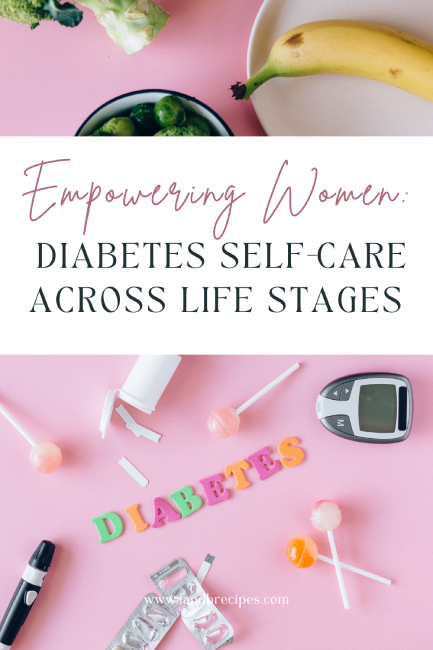Empowering Women: Diabetes Self-Care Across Life Stages
Diabetes is a chronic condition that requires daily self-care and management. For women, these needs can evolve over time due to major life events like puberty, pregnancy, and menopause. By understanding the unique challenges of each stage, women can empower themselves to take control of their diabetes care.
Adolescence
The transition from childhood to adulthood brings newfound freedoms and responsibilities. During puberty, hormone fluctuations can make blood sugar levels more challenging to control.
Here are some tips for teenage girls managing diabetes:
- Work closely with your diabetes care team. They can provide guidance tailored to your changing needs during puberty. Ask plenty of questions.
- Involve friends and family in your care. Explain how they can provide support through reminder texts, low treatment supplies, etc.
- Use mobile apps and technology to help track blood sugar, count carbs, dose insulin, etc. The more data you have, the better.
- Don’t ignore warning signs like extreme thirst, frequent urination, blurry vision, etc. If you are uncertain, check your blood sugar.
- Make healthy food choices when possible. Limit junk food without completely restricting treats.
- Stay active. Exercise helps manage blood sugar and mood swings.
- Connect with other teens who have diabetes. They understand the unique pressures you face.
Motherhood
Motherhood brings profound joy as well as new health considerations. Pregnant women with diabetes must ensure their safety and that of their babies.
Pregnancy Tips
- Work closely with your healthcare team to reduce the risk of complications.
- Monitor blood sugar levels frequently to achieve tight control, especially in the first trimester.
- Be open to adjusting your insulin dosage if need be.
- Watch for signs of low blood sugar, and always have quick-acting glucose tablets on hand.
Postpartum & Early Motherhood Tips
- Check blood sugar before, during, and after breastfeeding. Milk production can drain glucose levels unexpectedly.
- Ensure snacks like nuts, cheese, and hard-boiled eggs are readily available for quick, nutritious energy.
- Ask friends and family for help so you can focus on diabetes management and bonding with the baby.
- If you’re struggling with baby blues or postpartum depression, seek professional help. Caring for mental health is vital.
- Join support groups for solidarity and exchange of practical advice. You are not alone.
Perimenopause & Menopause
Perimenopause and menopause present new challenges in the form of fluctuating hormones. During this transition, focus on tailoring your diabetes management.
Blood Sugar Management
- Monitor frequently to understand patterns.
- Discuss insulin adjustments with your doctor to counteract increased insulin resistance.
- Be vigilant for signs of low blood sugar.
- Stay hydrated and avoid triggering foods like salt, caffeine, and alcohol.
Lifestyle Adjustments
- Focus on stress reduction through restorative yoga, meditation, etc. This helps manage cortisol spikes.
- Prioritise sleep by setting a calming bedtime routine without electronics.
- Adopt a nutritious anti-inflammatory diet emphasizing produce, healthy fats and lean protein.
- Stay active with exercise you enjoy, whether walking, dancing or gentle strength training.
Holistic Support
- Consider compounded bioidentical hormone therapy under a doctor’s guidance only if disabling symptoms occur.
- Explore nutritional supplements like sage, maca root, and vitamin E, which may help stabilize cycles.
- Discuss with your doctor whether metformin could help counteract age-related insulin resistance and inflammation. When it comes to metformin and anti-aging, some research and doctor’s guidance can be helpful.
- Interact with women navigating diabetes and menopause changes.
Golden Years
Transitioning into later decades requires focusing on maintaining health, happiness, and independence. Women must empower themselves, especially while managing diabetes:
Preserving Mobility and Independence
- Perform gentle strength training and flexibility exercises to maintain musculoskeletal health. This prevents injury and disability while allowing you to retain independence for daily activities.
- Utilize assistive devices like canes, grab bars and elevated toilet seats to foster safe mobility.
- Schedule yearly vision exams to monitor for retinopathy. Use assistive magnification tools as needed when reading, solving puzzles and crafting.
Blood Sugar Management
- Set reminders for checking blood sugar levels and taking medications.
- Simplify your diet with easy-to-prepare whole foods like fresh fruits, vegetables, lean proteins and whole grains.
- Drink plenty of water and include fiber-rich foods at meals to prevent constipation.
Holistic Wellbeing
- Attend community events like book clubs and concerts to nourish social connections.
- Consider adopting a pet for companionship and a sense of purpose.
- Explore integrative therapies like massage, acupuncture, and mindfulness meditation to help manage stress and discomfort.
- Lean on loved ones and professionals when needed.
In Conclusion: Tailoring Care Across All Life Stages
For women living with diabetes, self-care needs and obstacles evolve across major life stages. From the first menstrual cycle to postmenopausal years, fluctuating hormones impact blood sugar control and well-being. Adding to the complexity, priorities like relationships, career, pregnancy, and independence also shift over time. Fortunately, women can break down barriers and take empowered action by arming themselves with stage-specific knowledge.




